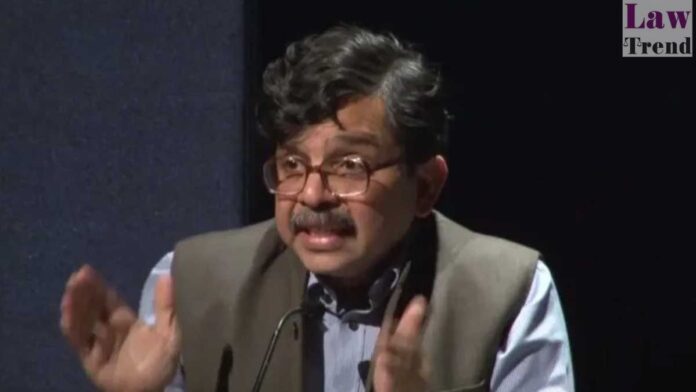Justice S. Muralidhar, former Chief Justice of the Orissa High Court and editor of the recently released book “Incomplete Justice: The Supreme Court at 75,” has advocated for significant reforms within the Indian judiciary, emphasizing the need for greater accountability, transparency in judicial transfers, and a more diverse representation on the bench. In an interview on ‘The Lallantop’ during the launch of his book, Justice Muralidhar offered sharp critiques of current judicial practices and called for a re-evaluation of the Supreme Court’s approach to various legal and administrative matters.
Critique on Ayodhya Verdict and Missed Mediation Opportunity
Justice Muralidhar initiated a critical discussion surrounding the Supreme Court’s unanimous verdict on the Ayodhya dispute. He expressed concern that the Court failed to adequately explore the possibility of a mediated settlement, even when a mediation panel had submitted a “final report” indicating that some parties, notably the Sunni Central Waqf Board, had reached an agreement. He questioned the Court’s perceived haste in deciding the matter, particularly when considering the decades-long nature of the dispute, arguing that a little more effort could have brought the parties closer to a resolution. Justice Muralidhar emphasized that the Court, in such a sensitive matter, should have applied the law more rigorously rather than relying on “faith and belief”.
Questionable Timing and Opacity of Judicial Transfers
Addressing his own transfer from the Delhi High Court to the Punjab and Haryana High Court, Justice Muralidhar highlighted the suspicious timing of the official notification. While acknowledging that his transfer was “under process,” he pointed out that the notification was issued late at night (around 11:35 PM or 11:40 PM) on the same day he had presided over hearings related to the Delhi riots and hate speech, where he had called for action against powerful individuals. He underscored the opaque nature of judicial transfers, stating that judges are typically not informed of the actual reasons for their transfers, which he considers a “flaw or lacuna in the system” that violates natural justice. He referenced Justice Madan B. Lokur’s similar concerns about executive influence on such transfers.
Advocacy for Judicial Accountability and Discipline
Justice Muralidhar strongly advocated for a more structured mechanism to address disciplinary issues among High Court and Supreme Court judges. He argued that the current system, which primarily relies on impeachment for removal, lacks effective methods for disciplining judges for “lesser misdemeanors”. He criticized the practice of “punishment postings,” where judges are transferred to different High Courts as a form of disciplinary action, calling it a “lazy way” of dealing with the situation.
Concerns over Justice Varma’s Case and Lack of Investigation
The former Chief Justice raised significant concerns regarding the case of Justice Yashwant Varma, where a substantial amount of cash was reportedly found in his outhouse, yet no First Information Report (FIR) was registered. He questioned the lack of cooperation from the Delhi Police in the matter and emphasized that proper investigation, including forensic analysis, cannot occur without police assistance. He highlighted a perceived “double standard” where such cases, involving a judge’s reputation, are publicized through video footage, contrasting it with the confidentiality often maintained in cases of sexual harassment allegations against judges.
Call for Broader Exposure and Diversity on the Bench
Justice Muralidhar concurred with journalist P. Sainath’s observation that the Supreme Court might lack a comprehensive understanding of rural India’s realities. He attributed this to the background of many lawyers who become judges, often having limited exposure to the challenges faced by the rural poor and other marginalized sections of society due to criteria such as income levels for judicial appointments. He stressed that judges in constitutional courts deal with a wide array of issues and therefore require diverse exposure.
Reforming Criminal Contempt and Embracing a Sense of Humor
Commenting on the use of criminal contempt, Justice Muralidhar opined that the judiciary has “regressed” in its approach, applying it too frequently compared to other jurisdictions. He urged judges to possess “broad shoulders” and a “sense of humor” to withstand criticism, rather than reacting to every minor public reaction.
“Incomplete Justice”: A Reflection on the Judiciary’s Role
Explaining the title of his book, “Incomplete Justice,” Justice Muralidhar linked it to Article 142 of the Constitution, which empowers the Supreme Court to pass orders for “doing complete justice.” He suggested that despite this power, often the outcomes of judicial decisions are perceived as incomplete, or they inadvertently add burdens to litigants.
Disclaimer-
The views and opinions expressed in this article are those of the individual speakers (Justice S. Muralidhar, Senior Advocate Indira Jaising, and Senior Advocate Raju Ramachandran) and do not necessarily reflect the official policy or position of “Law Trend” or its affiliates. This article is intended for informational and educational purposes only. The content provided is not legal advice, and viewers should not act upon this information without seeking professional counsel. Viewer discretion is advised.




